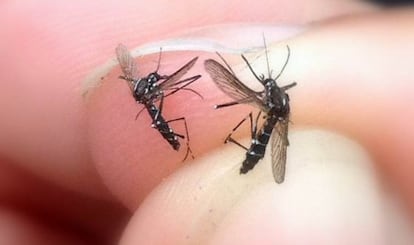First case of chikungunya infection in Spain was false alarm, new tests show
Man thought to have been first to contract virus on Spanish soil did not have disease


A Valencia man identified in July as the first person to have contracted the chikungunya virus from an infected mosquito in Spain did not in fact suffer from the disease, new tests have confirmed.
The first result was a false positive, Valencia regional health officials said on Thursday, meaning that all cases of chikungunya so far recorded in Spain have been contracted outside the country.
A second test carried out in a Madrid laboratory came back negative and a third confirmed the new result
Spanish health authorities have been closely watching the rampant spread of the tiger mosquito (Aedes albopictus), which transmits the tropical disease, in the country over the course of the summer. After an initial test for the disease on a 60-year-old man from Gandía came back positive in July, Valencia health officials activated the protocols in place, which included informing the media.
But a second test conducted in a laboratory in Majadahonda, Madrid, came back negative and a third confirmed the new result.
“Looking at the latest serology tests carried out, the patient did not suffer the disease,” the Valencia regional health department said in a press release.
The 21 cases of chikungunya detected in the region this year have all been imported, which is to say the patients were all infected in countries where the disease is endemic, the health department noted.
The European public health authority published an extensive report on what had been believed to be the first case of chikungunya infection in Spain, and called for heightened measures to curb the spread of the tiger mosquito, which also transmits diseases such as dengue fever and yellow fever.
The tiger mosquito was first detected in Spain in 2004 in Catalonia and it has since been expanding down the Mediterranean coast.
Chikungunya typically causes joint pain and fever, and has no known specific treatment.
English version by Nick Funnell.
Tu suscripción se está usando en otro dispositivo
¿Quieres añadir otro usuario a tu suscripción?
Si continúas leyendo en este dispositivo, no se podrá leer en el otro.
FlechaTu suscripción se está usando en otro dispositivo y solo puedes acceder a EL PAÍS desde un dispositivo a la vez.
Si quieres compartir tu cuenta, cambia tu suscripción a la modalidad Premium, así podrás añadir otro usuario. Cada uno accederá con su propia cuenta de email, lo que os permitirá personalizar vuestra experiencia en EL PAÍS.
¿Tienes una suscripción de empresa? Accede aquí para contratar más cuentas.
En el caso de no saber quién está usando tu cuenta, te recomendamos cambiar tu contraseña aquí.
Si decides continuar compartiendo tu cuenta, este mensaje se mostrará en tu dispositivo y en el de la otra persona que está usando tu cuenta de forma indefinida, afectando a tu experiencia de lectura. Puedes consultar aquí los términos y condiciones de la suscripción digital.








































